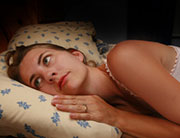- Could Artificial Sweeteners Be Aging the Brain Faster?
- Techniques for Soothing Your Nervous System
- Does the Water in Your House Smell Funny? Here’s Why
- Can a Daily Dose of Apple Cider Vinegar Actually Aid Weight Loss?
- 6 Health Beverages That Can Actually Spike Your Blood Sugar
- Treatment Options for Social Anxiety Disorder
- Understanding the Connection Between Anxiety and Depression
- How Daily Prunes Can Influence Cholesterol and Inflammation
- When to Take B12 for Better Absorption and Energy
- Epsom Salts: Health Benefits and Uses
Menopausal Women’s Sleep May Suffer at Different Times of the Month


As women begin menopause, hormone fluctuations increase the risk of sleep problems during certain phases of the menstrual cycle, according to a small new study.
Researchers analyzed the sleep patterns of 20 women in the earliest stage of menopause (perimenopause), including 11 who had difficulty sleeping at least three times a week for at least a month.
The investigators found that women have more sleep disturbances just prior to menstruation than after menstruation, according to the study published June 16 in the Journal of Clinical Endocrinology & Metabolism.
The days before they got their periods was when their progesterone levels were higher, the researchers said.
“Measures of electrical brain activity found that the hormone progesterone influences sleep, even at this late reproductive stage in perimenopausal women,” researcher Fiona Baker, of the Center for Health Sciences at SRI International in Menlo Park, Calif., and the University of the Witwatersrand in Johannesburg, South Africa, said in a journal news release.
“Menstrual cycle variation in hormones is one piece in the overall picture of sleep quality in midlife women,” she said.
“This research can lead to a better understanding of the mechanisms behind sleep disturbances during the approach to menopause and can inform the development of better symptom management strategies,” Baker concluded.
More information
The American Academy of Family Physicians has more about menopause.
Source: HealthDay
Copyright © 2026 HealthDay. All rights reserved.










